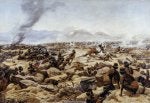Joined Jul 2021
2,391 Posts | 2,067+
The Other Side
I do not believe i have to explain the gun-slave model to anyone who's a member of this forum but for the sake of clarity i will do it in a needlessly supersimplified way (bit of a contradiction i know).
If you were able to make sense of that incoherent thought box you just read then you might come to the conclusion that there was an arms race in Africa during the transatlantic slave trade, or atleast in the places that were trading slaves. That isn't what im talking about when i say arms race.
What I mean by "arms race" is the development of weapons technology amongst African polities during the period i'm talking about. Its good and well to buy more guns than the other guy has but the problem is you're still beholden to the traders who sold you those guns and loyalty is not a thing when dealing with money. The same guy who sold you weapons today would do the same for your mortal enemy if he offered a larger amount of cash. You would do better to develop your own guns.
Setting up an arms industry is also most needed when you consider the fact that all guns sold to African kingdoms were of subpar quality, and they/we knew it too.
So with all of the above, why did an arms race not take place in West Africa during the Transatlantic slave trade with all the wars going on the same way it did in sengoku jidai era Japan where there was concentrated effort towards building an arms industry?
I don't know anyone on here who specifically posts about Japanese history and would know enough to correct me if my assumptions about the Japanese arms industry are wrong but i do know two posters with sufficient knowledge in African history to answer my question so ill tag them.
@Sundiata1 & @Ighayere
| King need gun and merchant need slave - King go war and get slave - Merchant sell king gun for slave - King need more gun because enemies plenty who also have gun - King do more war to get more slave to buy more gun. |
If you were able to make sense of that incoherent thought box you just read then you might come to the conclusion that there was an arms race in Africa during the transatlantic slave trade, or atleast in the places that were trading slaves. That isn't what im talking about when i say arms race.
What I mean by "arms race" is the development of weapons technology amongst African polities during the period i'm talking about. Its good and well to buy more guns than the other guy has but the problem is you're still beholden to the traders who sold you those guns and loyalty is not a thing when dealing with money. The same guy who sold you weapons today would do the same for your mortal enemy if he offered a larger amount of cash. You would do better to develop your own guns.
Setting up an arms industry is also most needed when you consider the fact that all guns sold to African kingdoms were of subpar quality, and they/we knew it too.
So with all of the above, why did an arms race not take place in West Africa during the Transatlantic slave trade with all the wars going on the same way it did in sengoku jidai era Japan where there was concentrated effort towards building an arms industry?
I don't know anyone on here who specifically posts about Japanese history and would know enough to correct me if my assumptions about the Japanese arms industry are wrong but i do know two posters with sufficient knowledge in African history to answer my question so ill tag them.
@Sundiata1 & @Ighayere




